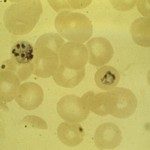Link to Pubmed [PMID] – 38363132
Link to DOI – 10.1128/spectrum.03500-23
Microbiol Spectr 2024 Feb; (): e0350023
During blood-stage infection, Plasmodium falciparum parasites are constantly exposed to a range of extracellular stimuli, including host molecules and drugs such as artemisinin derivatives, the mainstay of artemisinin-based combination therapies currently used as first-line treatment worldwide. Partial resistance of P. falciparum to artemisinin has been associated with mutations in the propeller domain of the Pfkelch13 gene, resulting in a fraction of ring stages that are able to survive exposure to artemisinin through a temporary growth arrest. Here, we investigated whether the growth arrest in ring-stage parasites reflects a general response to stress. We mimicked a stressful environment in vitro by exposing parasites to chloroquine or dihydroartemisinin (DHA). We observed that early ring-stage parasites pre-exposed to a stressed culture supernatant exhibited a temporary growth arrest and a reduced susceptibility to DHA, as assessed by the ring-stage survival assay, irrespective of their Pfkelch13 genotype. These data suggest that temporary growth arrest of early ring stages may be a constitutive, Pfkelch13-independent survival mechanism in P. falciparum.IMPORTANCEPlasmodium falciparum ring stages have the ability to sense the extracellular environment, regulate their growth, and enter a temporary growth arrest state in response to adverse conditions such as drug exposure. This temporary growth arrest results in reduced susceptibility to artemisinin in vitro. The signal responsible for this process is thought to be small molecules (less than 3 kDa) released by stressed mature-stage parasites. These data suggest that Pfkelch13-dependent artemisinin resistance and the growth arrest phenotype are two complementary but unrelated mechanisms of ring-stage survival in P. falciparum. This finding provides new insights into the field of P. falciparum antimalarial drug resistance by highlighting the extracellular compartment and cellular communication as an understudied mechanism.

